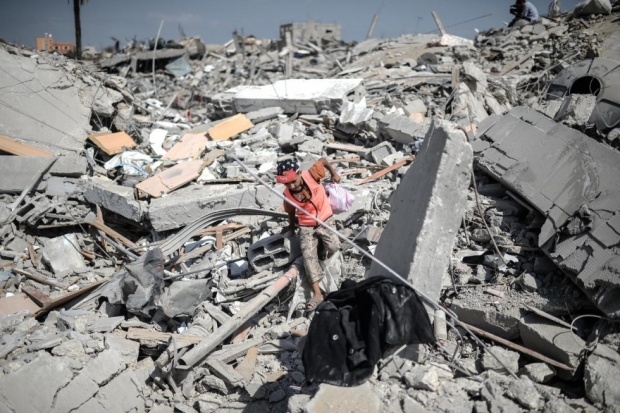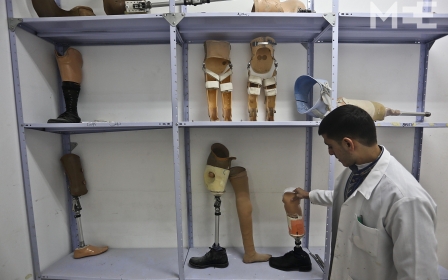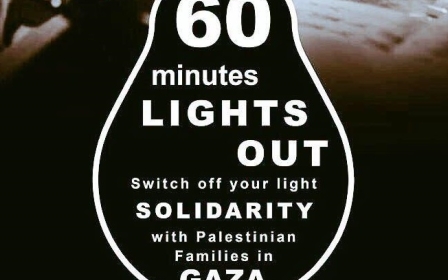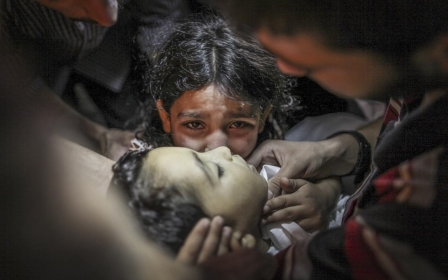Palestinians reach out to the world with '1,000 Voices for Gaza'

Denny Cormier, a 68-year-old retired businessman from the United States, is helping Gaza reach out to the world.
Through his project, "1,000 Voices for Gaza", Palestinians are learning how to effectively use social media such as Facebook and Twitter to share stories of what it's like to live in the besieged enclave.
The project is a form of resistance, a sort of cyber militia, where activists can share news of what's happening around them without having to rely on mainstream media.
"I came here [to Gaza] because I realised that what I was seeing in the media [in the US] very often seemed to be very pro-Israel," Cormier said. "And I wasn’t meeting terrorists on social media; I was meeting really good people. So I had to come here myself and see what is really happening here, what is Gaza all about?”
"There is great potential here in Gaza for people to tell their story. The questions that I was asked pretty regularly in Gaza were: 'Does anyone care about us? Is anyone even listening to what’s going on in Gaza?'"
Since the Gaza Strip has been under an Israeli blockade by land, air and sea since 2007, Gaza residents have relied heavily on technology to break barriers and connect with the outside world.
Cormier, who has been living in Gaza since March 2014, noticed the popularity of social media, and after chatting with Gazans in tea houses and coffee shops, he decided to channel the interest into activism.
Along with his friend and project co-founder Nader Abd El Naby, he has been leading seminars and workshops where participants learn how to define their target audience, build a network of followers and friends, and learn ways to connect with Western countries through photography, videos, music and other tools.
"They're more orientated towards extending the hand out from Gaza as opposed to waiting for people to come looking for you," Cormier said.
1,000 Voices for Gaza actually has a lot more voices than that; more than 2,000 people have participated in the seminars and workshops since the project formed eight months ago.
The four-day workshop, titled "Empowering Women in Social Media", garnered such strong interest that another session for men opened, as well.
The project also provides a chance for Palestinians in Gaza to learn and connect with people worldwide who support them. Many Gazans have never heard of groups such as Students for Justice in Palestine in university campuses across North America and Europe. Social media is still fairly new and they're learning how to make connections and network, Cormier explained.
El Naby, a 28-year-old grad student at the Islamic University of Gaza who also sponsored Cormier to come to Gaza, says social media provides an outlet to share stories of their struggles of daily life.
Local infrastructure remains in ruins after last summer's war, and reconstruction materials, such as cement and steel are banned from entering Gaza.
"Under humanitarian and international law, the occupation forces should provide the daily needs and supplies for the people under occupation," El Naby said.
"Unfortunately, Israel is an occupation force and they don't provide anything… They allow a very [small] amount of materials to enter Gaza which can't meet the demands of 1.8 million Gazans living in the strip," El Naby said.
The Egyptians are also complicit in besieging Palestinians in Gaza, having closed the Rafah border crossing, further banning their movement, El Naby explained.
"The voices of the Gaza people are unheard by the world," El Naby said. "We are letting people know about the reality and truth about people living under occupation, who were bombarded during the 51-day aggression."
Humanity for Palestine, an online global citizen’s action collective, is urging residents to break the silence by engaging in a Facebook and Twitter media storm from December 18-20, using the hashtags #GazaUnderRubble and #ICantBreathe.
The power of social media became evident during last summer's conflict when news emerged that an Israel student union set up a “war room” to spread pro-Israel propaganda on social media.
In late July, the hashtag #GazaUnderAttack was reported to have been used more than four million times while #IsraelUnderFire had been tweeted 200,000 times. The news flooded with reports saying Israel was losing the social media war.
Throughout the attacks, Cormier continuously posted his observations from Gaza to his 8,350 followers on Facebook and Twitter.
There was no shortage of stories as he spent 12-hour shifts at the al-Shifa hospital with other international activists acting as human shields.
Over 2,220 people shared his most popular Facebook post from July 28. In it he wrote:
"I just returned from al-Shifa Hospital. The area had been targeted moments before I arrived, and it was also announced that 10 children have died [so far] in a horrific attack on a park in al-Shati refugee camp [with 40 others injured]. I heard the explosions from my home. They shook my building. The children must have died instantly. They will suffer no more."
Of course, there is more to life in Gaza than war and aggression. Cormier recounts stories of the newest restaurant that popped up in Gaza, what wedding celebrations are like and of young runners training in Beit Lahia.
He documents children going to school and students graduating from university. He posts photos of youth soaring through the air while practicing parkour from skeleton buildings and of children laughing at the al-Amal Orphanage after dancing the dabke.
With El Naby, he visits refugee camps and villages such as Khuza'a, where families live in trailers after Israel bombed their village.
For Cormier, every day for the past two years has been dedicated to Gaza. Why?
"It's the people," Cormier said. "They're almost generous to a fault. If they think you need something, they're gonna take care of you."
He laughs remembering the time poor children approached him last summer during the Israeli assault asking him if he was in need of money. "Listen, I can give you 20 shekels if you need something," they told him.
Cormier was involved in the Occupy Movement and in human rights activism in the US, but he never felt the kind of intimacy, friendship and loyalty between people like in Gaza.
"People say to me, 'Thank you so much for supporting our country,' they say this to me every day.”
"I say to them, 'It’s a blessing to be here because I haven't ever experienced this in the 67 years that I've lived in the US.'"
Middle East Eye propose une couverture et une analyse indépendantes et incomparables du Moyen-Orient, de l’Afrique du Nord et d’autres régions du monde. Pour en savoir plus sur la reprise de ce contenu et les frais qui s’appliquent, veuillez remplir ce formulaire [en anglais]. Pour en savoir plus sur MEE, cliquez ici [en anglais].




